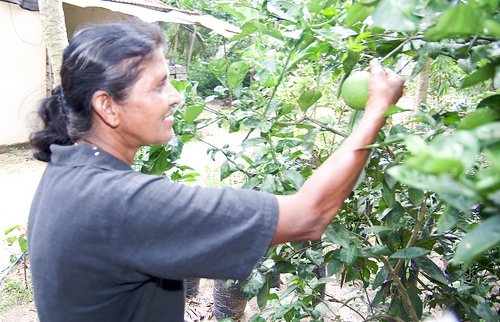
January 3, 2014, by adam
Food sovereignty in the UK
Food security has become the dominant framing of agri-food policy and research in the UK. However, it is not the only framing. In this post we take a look at one of the alternatives, food sovereignty. We look for food sovereignty in policy, in research, and in the media. We also explore the emerging food sovereignty movement within the UK.
While food security is the dominant term used, there is some debate about its meaning. However, there is broad agreement that it includes everyone having access to safe, nutritious food at all times, sufficient to support an active and healthy life. Following the food price spike of 2007-08 food security became identified by Defra as a cause for concern although this policy document noted that the UK enjoyed a high level of food security.
The recent Foresight report, The Future of Food and Farming (2011), examined the challenges of climate change, a rising global population, changing dietary demands as countries become wealthier, and increasing competition for resources such as water and land, and concluded that a policy of sustainable intensification – producing more food with the same or lower environmental impact – was required.
In these, and other, policy documents food security is seen to be promoted by open markets. An alternative frame, food sovereignty, is characterised by Foresight as being associated with national trade protectionism and self-sufficiency which are rejected in the report.
However, this is only a partial understanding of food sovereignty. Food sovereignty is often associated with the international peasants’ movement La Via Campesina. This movement of small farmers, agricultural workers and others advocates local food under the control of those who produce it and argues that this, food sovereignty, is the best way to guarantee food security for local people.
The food sovereignty movement is based on six pillars (food for people, value providers, local food, local control, building knowledge, and working with nature) explained more fully in this piece by the UK’s World Development Movement, one of the leading groups in the UK’s emerging food sovereignty movement.
With food security the dominant framing of food provisioning, we wondered if food sovereignty was represented within UK food research agendas. We examined the published strategies and websites of the UK research councils for food sovereignty and, using suitable search terms, looked for food sovereignty research in British universities and research institutes.
We found only four references, all on the ESRC site, to projects that explicitly used the food sovereignty frame on the websites of the UK research councils. All of these were projects focused on countries in the global south. Limited engagement with food sovereignty was found in searches of research institutes and, again, most were projects focused on the global south. In universities, we found eleven with dedicated food security webpages and, of these, four had some engagement with food sovereignty within those programmes. Though our research was limited to websites and published strategies, we can conclude that in agri-food research, the food sovereignty frame is a minority one in comparison with food security.
We also examined the extent to which food sovereignty had a public presence in the national media. We searched for ‘food sovereignty’ in UK national newspapers for the period January 2000 to May 2013. Fifty-two stories were identified of which twenty-two were in The Guardian or The Observer, seventeen in the Morning Star, five in The Independent and two in The Times or Sunday Times. Only six stories were found in tabloid newspapers. The high proportion of stories in the left-wing daily Morning Star is, we suggest, indicative of food sovereignty containing an oppositionist element to food security which is seen as representing a more neo-liberal agenda.
Finally we asked if there was a food sovereignty movement in the UK. We discovered that there was but that it was very recent, embryonic and small. Indeed, so far as we can currently establish, the movement dates from as recently as 2012. There is an umbrella group of 22 partner organisations, Food Sovereignty Now! The members reflect various facets of the food sovereignty frame with some focusing on rejecting GMOs, and some supporting small farmers for example. There is also a strong presence of international development groups such as War on Want and the World Development Movement.
In the UK, we conclude, food sovereignty is a minority approach to framing agri-food challenges compared with food security. It is rejected in UK policy documents and, while there is some research being conducted which explicitly uses the food sovereignty frame, this is tiny in comparison to food security and often has the global south as its focus of study. Public representation of the frame is also small and tends to be concentrated in the liberal Guardian and radical Morning Star. The fifty-two stories found using food sovereignty is in comparison with a search for ‘food security’ which yielded over 3,000 hits.
We must acknowledge that our methodology has some shortcomings and can offer only an indicative picture. We know, for example, that there is a good deal of research being carried out into topics such as local food which reflects some of the concerns of the food sovereignty frame while not ‘branding’ itself as such research. In future work we will explore both the food sovereignty and food security frames more closely within particular institutions and by individual researchers to understand more fully how agri-food research agendas are negotiating these concepts.
Adam Spencer, Carol Morris and Susanne Seymour (School of Geography, University of Nottingham and Leverhulme Making Science Public Programme)
Photograph credit: <a href=”http://www.flickr.com/photos/45005153@N07/8660555647/”>PWRDF</a> via <a href=”http://compfight.com”>Compfight</a> <a href=”http://creativecommons.org/licenses/by/2.0/”>cc</a>

[…] are clearly policy challenges involved with agriculture that include environmental protection and food security. GM insects may or may not play a role in addressing these challenges, but they need to be […]